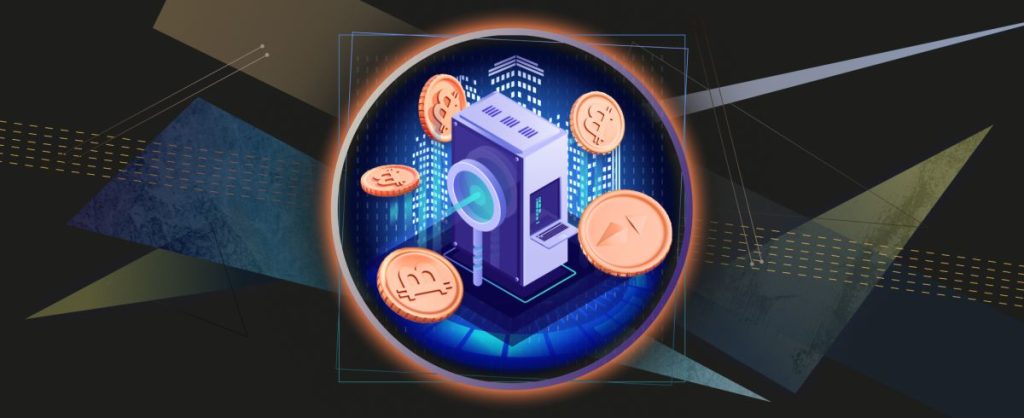Where are crypto ATMs most popular?

Crypto ATMs are usually located in airports and large shopping malls. They’re not aimed at replacing traditional ATMs, but rather to make the initial crypto experience simple for fiat users simply by simulating cash outs at regular ATMs.
On this page
Over the past two years, the total number of installed cryptomats in the world nearly quadrupled, reaching the 40,000 mark. Statistics from CoinATMradar show that there are now 78 countries with installed crypto ATMs.
General statistics
These cryptomats go by a variety of names, including crypto ATM (Automated Teller Machine), crypto terminal, and Bitcoin ATM. They come in a variety of sizes and shapes, ranging from tiny wall-mounted mailboxes to big ATMs and self-service kiosks (SSK).
Cryptomats were initially only used to purchase crypto (mainly Bitcoin) with cash. Similar to ATMs, these devices had cassettes for accepting banknotes that needed to be collected on a regular basis. This led to a significant expansion in the number of services offered, as the result, these ATMs with extended functionality started to closely resemble self-service terminals. Through cryptomats, you can create a digital wallet for a particular coin, buy crypto with bank cards, sell crypto for cash, make transfers and payments in cryptocurrencies.
Various models of crypto ATMs from General Bytes
Who installs crypto ATMs
The main industry players are mostly American independent operators and processors, as well as owners of big crypto ATM networks, such as Bitcoin Depot (6,773 crypto ATMs), Coin Cloud (4,956 crypto ATMs), CoinFlip (3,922 crypto ATMs), Bitcoin of America (2,577 crypto ATMs), and others.
Сrypto exchanges connect to ATMs to boost their user base. This is done in order for people to first buy cryptocurrencies for cash or through bank cards in cryptomats, which may result in trading them on the exchange. This strategy can work out since the wallets for holding the purchased crypto are generated by the exchange itself, and they are accessible via the exchange terminal (via a website or mobile application).
Which companies are leaders in the production of crypto ATMs
The largest producers of crypto ATMs are American companies BitAccess (30.9% of the market), General Bytes (23.4% of the market), and Genesis Coin (22.10% of the market). Other manufacturers have a market share of less than 10%. BitAccess has concentrated its presence exclusively in the United States. Genesis Coin's strategy is based on growth throughout North and South America (USA, Canada, Brazil, and Colombia). In addition to these countries, General Bytes actively sells crypto ATMs throughout Europe via its Czech representative office in Prague, where the majority of the production facilities are based. Due to this, General Bytes was able to gain a 63.3% market share in Europe. There are local manufacturers of crypto ATMs in almost every country, but their market share is so small that they do not fall into the general statistics.
Crypto ATM share via manufacturer
Let's examine the structural and functional differences between such machines in different countries, as well as the territories that are most loyal to the use of crypto ATMs.
The USA (more than 34,200 crypto ATMs) and Canada (almost 2,700 crypto ATMs) are the top two countries in terms of the number of crypto ATMs installed. Let's start with them.
Map of crypto ATMs’ location
USA and Canada
Crypto ATMs in the US are called DCA (Digital Currency ATMs). Due to the significant dominance of cash over non-cash instruments in the United States, ATMs with support of cash-out and cash-in activities are in demand.
CoinFlip crypto ATM
The simplest and most common method for purchasing crypto in the United States is to create a digital wallet on your own, buy cryptocurrency for cash in a crypto ATM, and receive those purchased coins in your wallet.
The most common scheme for purchasing crypto in the USA
Crypto ATMs that accept bank cards are also available in the United States. But it’s much harder to find them, as operators buy them in tiny amounts. Why? Such crypto ATMs are more expensive due to the presence of a card reader.
The largest crypto ATM networks in the US are owned by 10 operators with 26,559 devices, controlling 68.3% of the market in the world. The remaining 586 smaller operators from different countries represent another 31.7% of the market (12,323 devices).
TOP-10 crypto ATM operators in the USA
The largest network in Canada is owned by Localcoin (845 crypto ATMs, 32.4% of the market). Other firms, including American ones (Bitcoin Depot), operate small networks with only a few hundred devices and have a market share of less than 10%.
Europe
The European continent ranks second in the world in terms of the number of crypto ATMs. The largest network in Europe belongs to the Austrian operator Kurant with a 14.4% market share. The company placed 220 crypto ATMs throughout Austria, Germany, Spain, and Greece. The second largest operator has an interesting name, Shitcoins.Club, which has nothing to do with crypto ATM networks. This Polish company has a market share of 12.8% and installed 191 crypto ATMs in the UK, Spain, the Netherlands, Italy, Romania, Poland, and Ukraine.
Other operators with less than 10% market share include Spanish BitBase, Bitcoin Romania, Swiss Vardex, and others, as well as regional networks with a small number of crypto ATMs. Non-cash transactions predominate in Europe, hence crypto ATMs that accept payments with bank cards are common here.
TOP-10 crypto ATM operators in Europe
Other regions
Other continents just started to develop networks. 152 crypto ATMs have been placed in Hong Kong, Asia, and over 160 ATMs have been installed in Australia. Although Africa has yet to achieve successes, the process of replacing traditional ATMs with crypto ATMs is ongoing and this cannot be stopped. We will discuss more exotic methods for purchasing crypto in another article. Check back for updates.
The content on The Coinomist is for informational purposes only and should not be interpreted as financial advice. While we strive to provide accurate and up-to-date information, we do not guarantee the accuracy, completeness, or reliability of any content. Neither we accept liability for any errors or omissions in the information provided or for any financial losses incurred as a result of relying on this information. Actions based on this content are at your own risk. Always do your own research and consult a professional. See our Terms, Privacy Policy, and Disclaimers for more details.



































